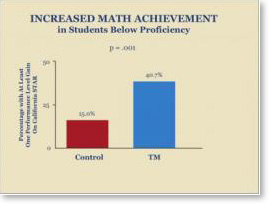The Transcendental Meditation technique may be an effective approach for improving math and academic English achievement in low-performing students, according to a new study published in the prestigious journal Education.
The study was conducted in a public middle school in California with 189 students who were below proficiency level in English and math. Change in academic achievement was evaluated using the California Standards Tests (CST).
 Students who practiced the Transcendental Meditation technique showed significant increases in math and English scores over a one-year period. A significant portion of the meditating students — 41 percent — showed a gain of at least one performance level in math, compared to 15 percent of the non-meditating students in the control group. Among the students with the lowest levels of academic performance, “below basic” and “far below basic,” the meditating students showed a significant improvement in overall academic achievement compared to students in the control group, which showed only a slight gain.
Students who practiced the Transcendental Meditation technique showed significant increases in math and English scores over a one-year period. A significant portion of the meditating students — 41 percent — showed a gain of at least one performance level in math, compared to 15 percent of the non-meditating students in the control group. Among the students with the lowest levels of academic performance, “below basic” and “far below basic,” the meditating students showed a significant improvement in overall academic achievement compared to students in the control group, which showed only a slight gain.
The middle school level is of particular concern to educators because of low academic performance nationally. Sixty-six percent of eighth-grade students are below proficiency level in math and 68 percent are below proficiency level in reading, based on 2009 National Assessment of Educational Progress data. Nearly 1.3 million students did not graduate from high school in 2010.
According to the United States Department of Education, turning around low performing students and schools is a top priority for America government. Speaking on this issue, Secretary of Education, Arne Duncan said, this is “part of our overall strategy for dramatically reducing the drop-out rate, improving high school graduation rates and increasing the number of students who graduate prepared for success in college and the workplace.”
 “This initial research, showing the benefits of the Quiet Time/Transcendental Meditation program on academic achievement, holds promise for public education,” according to Sanford Nidich, Ed.D., lead author and professor of education at Maharishi University of Management. “The findings suggest that there is an easy-to-implement, value-added educational program which can help low-performing minority students begin to close the achievement gap,” said Nidich.
“This initial research, showing the benefits of the Quiet Time/Transcendental Meditation program on academic achievement, holds promise for public education,” according to Sanford Nidich, Ed.D., lead author and professor of education at Maharishi University of Management. “The findings suggest that there is an easy-to-implement, value-added educational program which can help low-performing minority students begin to close the achievement gap,” said Nidich.
The school’s faculty also gave the Transcendental Meditation program high marks. Faculty reported the meditating students to be calmer, happier, and less hyperactive, with an increased ability to focus on schoolwork. In terms of the school environment, faculty reported fewer student fights, less abusive language, and an overall more relaxed and calm atmosphere since implementation of the program.
 “The results of the study provide support to a recent trend in education focusing on student mind/body development for academic achievement,” said Dr. Ronald Zigler, study co-author and associate professor at Penn State University, Abington. “We need more programs of this kind implemented into our nation’s public schools, with further evaluation efforts.”
“The results of the study provide support to a recent trend in education focusing on student mind/body development for academic achievement,” said Dr. Ronald Zigler, study co-author and associate professor at Penn State University, Abington. “We need more programs of this kind implemented into our nation’s public schools, with further evaluation efforts.”
 The David Lynch Foundation for Consciousness-Based Education and World Peace is currently providing funding for the Quiet Time/Transcendental Meditation program in more than 350 schools.
The David Lynch Foundation for Consciousness-Based Education and World Peace is currently providing funding for the Quiet Time/Transcendental Meditation program in more than 350 schools.
Related Research:
New research finds TM helps ease school stress



